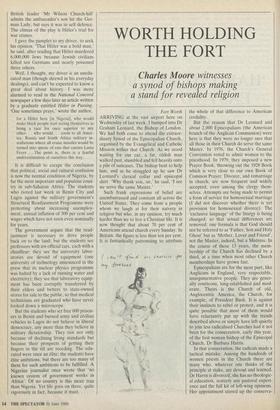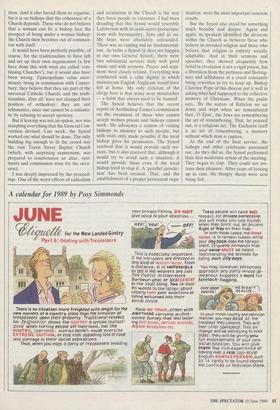WORTH HOLDING THE FORT
Charles Moore witnesses
a synod of bishops making a stand for revealed religion
Fort Worth ARRIVING at the vast airport here on Wednesday of last week, I bumped into Dr Graham Leonard, the Bishop of London. We had both come to attend the extraor- dinary Synod of the Episcopalian Church, organised by the Evangelical and Catholic Mission within that Church. As we stood waiting for our car, a fat, oldish man walked past, stumbled and fell heavily onto a pile of suitcases. The bishop bent to help him, and as he struggled up he saw Dr Leonard's clerical collar and episcopal shirt. 'Why thank you, sir,' he said, 'I see we serve the same Master.'
Such frank expressions of belief are unembarrassed and constant all across the United States. They come from a people whom we laugh at for their naivety in religion but who, in my opinion, try much harder than we to live a Christian life. It is now thought that about 70 per cent of Americans attend church every Sunday. In Britain, the figure is less than ten per cent. It is fantastically patronising to attribute the whole of that difference to American credulity.
But the reason that Dr Leonard and about 2,000 Episcopalians (the American branch of the Anglican Communion) were here is that they were no longer sure that all those in their Church do serve the same Master. In 1976, the Church's General Convention voted to admit women to the priesthood. In 1979, they imposed a new Prayer Book, throwing out the 1928 Book which is very close to our own Book of Common Prayer. Divorce, and remarriage in church, are now frequent and widely accepted, even among the clergy them- selves. Attempts are being made to permit a form of service for homosexual marriage (I did not discover whether there is yet provision for homosexual divorce). The 'exclusive language' of the liturgy is being changed, so that sexual differences are removed: one formula is that God should not be referred to as 'Father, Son and Holy Ghost' but as 'Mother, Lover and Friend', not the Master, indeed, but a Mistress. In the course of these 13 years, the mem- bership of the Church has declined by a third, at a time when most other Church memberships have grown fast.
Episcopalians are for the most part, like Anglicans in England, very respectable, unargumentative people. They are gener- ally courteous, long-established and mod- erate. Theirs is the Church of old, Anglocentric America, the Church, for example, of President Bush. It is against their instincts to rebel or protest, and it is quite possible that most of them would have reluctantly put up with the trends described above or simply have left quietly to join less radicalised Churches had it not been for the consecration, early this year, of the first woman bishop of the Episcopal Church, Dr Barbara Harris.
In that consecration, the radicals made a tactical mistake. Among the hundreds of women priests in the Church there are many who, whatever one thinks of the principle at stake, are devout and learned. Dr Harris is divorced, she has no theologic- al education, scarcely any pastoral experi- ence and the full kit of left-wing opinions. Her appointment stirred up the conserva- tives. And it also forced them to organise, for it is on bishops that the coherence of a Church depends. Those who do not believe that a woman can be a bishop face the prospect of being under a woman bishop: the Church then becomes out of commun- ion with itself.
It would have been perfectly possible, of course, for the traditionalists to have left and set up their own organisation (a few have done this with what are called 'con- tinuing Churches'), but it would also have been wrong. Episcopalians value enor- mously being in communion with Canter- bury; they believe that they are part of the universal Catholic Church; and the tradi- tionalists, after all, have not changed their position of orthodoxy: they are not schismatics, since one cannot be a schisma- tic by refusing to accept apostasy.
But if leaving was not an option, nor was accepting everything that the General Con- vention devised. Last week, the Synod worked out what should be done. The only building big enough to fit the crowd was the vast Travis Street Baptist Church (which, with surprising ecumenism, was prepared to countenance an altar, vest- ments and communion wine for the occa- sion).
I was deeply impressed by the proceed- ings. One of the worst effects of radicalism and secularism in the Church is the way they force people to extremes. I had been dreading that this Synod would resemble Lefebvrism with its semi-secret preoccupa- tions with freemasonry, Jews and so on. My fears were absolutely unfounded. There was no ranting and no fundamental- ism. As befits a Synod (it does not happen in our own General Synod), there were two substantial services daily with good music and with sermons. Prayer and argu- ment were closely related. Everything was conducted with a calm dignity in which mainstream English Anglicans would have felt at home. My only criticism of the clergy here is that many wear moustaches — a habit that always used to be banned.
The Synod believes that the recent report of Archbishop Eames's commission on the treatment of those who cannot accept women priests and bishops cannot work. He advocates a system of visiting bishops to minister to such people, but with visits only made possible if the local bishop gives his permission. The Synod resolved that it would provide such ser- vices, but it also resolved that, although it would try to avoid such a situation, it would provide them even if the local bishop tried to stop it. A 'parallel jurisdic- tion' has been created. That, and the establishment of a proper permanent orga- nisation, were the most important concrete results.
But the Synod also stood for something much broader and deeper. Again and again, its speakers identified the divisions within the Church as between those who believe in revealed religion and those who believe that religion is entirely socially adaptable. And in their sermons and speeches, they showed eloquently how belief in revelation is not a rigid prison, but a liberation from the pettiness and fleeting- ness and selfishness of a creed constantly being rewritten to try to keep up. Bishop Clarence Pope of this diocese put it well in asking what had happened to the collective memory of Christians. When the psalm says, 'By the waters of Babylon we sat down and wept when we remembered thee, 0 Zion', the Jews are remembering the act of remembering. That, he pointed out, is a religious act. The Eucharist itself is an act of remembering, a memory without which man is captive.
At the end of the final service, the bishops and other celebrants processed out. As they did so, the Synod performed their first modernist action of the meeting. They began to clap. They could not res- train their pleasure. After years of looking up in vain, the hungry sheep were now being fed.



























































 Previous page
Previous page